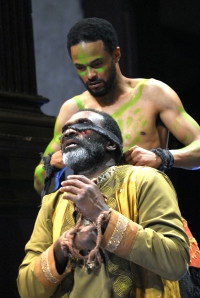By your leave, gods:—this is a Roman’s part
Come, Cassius’ sword
One of the great challenges of playing Cassius in Folger Theatre’s production of Julius Caesar is (spoiler alert!) committing suicide on-stage eight times a week.
In terms of the knife work, it isn’t a technically complex move. Casey Kaleba, our production’s fight director, has choreographed many a death over the years, and he’s designed a lovely little sleight of hand for me. It does take some physical exertion to put across the actual dying – complete with one last line: “Caesar! Thou art revenged, even with the sword that killed thee!” – and a collapse down several stairs.
Still, apart from the odd minor bruise, and the one night last week that the knife slipped slightly and stabbed a hole through my shirt, the physical component isn’t the greatest challenge.
Shakespeare takes on suicide, both as a conceptual possibility and as a grave reality, fairly frequently in his work. Consider Hamlet’s “To be or not to be that is the question,” and, “O, that this too too solid flesh would melt, thaw and resolve itself into a dew!” Cassius himself says, “But life, being weary of these worldly bars, never lacks power to dismiss itself.” Othello kills himself, as do both Romeo and Juliet. There are five suicides at the end of Antony and Cleopatra, including both of the title characters.
For me, one of the oddest suicide attempts is in Act IV, scene 6 of King Lear. The kind Edgar, in disguise as the madman Poor Tom, agrees to lead his blind father Gloucester to the edge of the cliffs of Dover – at his request – so that he may throw himself off to his death. What happens next is complex and bizarre and I’ll just suggest that you read it here on Folger Digital Texts.

Edgar and Gloucester from the 2007 Folger Theatre and Classical Theatre of Harlem production of King Lear.
To return to my initial point, the physical challenge of doing the role eight times a week is nothing compared to the emotional challenge. Suicide is not only a violent and terrifying act, it is also an incredibly intimate act. Sharing that intimacy with an audience is perhaps the largest challenge of all.
Here at Folger Theatre, I have died on-stage on numerous occasions. As Roderigo in Othello, I was stabbed, had my spinal cord cut at the back of my neck and was then hauled up the center aisle like a sack of potatoes.
As Bardolph in Henry V, I was placed on a stool, a noose placed around my neck, and the stool pulled from under my feet. This didn’t quite do the trick, so Pistol came and yanked my legs, breaking my neck. I was then carried off stage left like a sack of potatoes. As gruesome as all of that sounds, this death has affected me most deeply, because I do it to myself.
- As Bardolph in Henry V.
- As Roderigo in Othello. With Ian Peakes as Iago.
This weekend at the theater, my parents came to visit me and see Julius Caesar. They were seated in the front row, some 5 feet away from the platform on which Cassius kills himself, very much in my eyeline. To be alone onstage, armed with a knife that I must plunge upwards under my ribcage, with 250 people including my mother and father watching, well, let’s just say I’m grateful to have a day off.
Come and see Julius Caesar! You have until December 7. Also, why not follow me on Twitter? @louisbutelli
Stay connected
Enter your email address to follow this blog and receive notifications of new posts by email.




